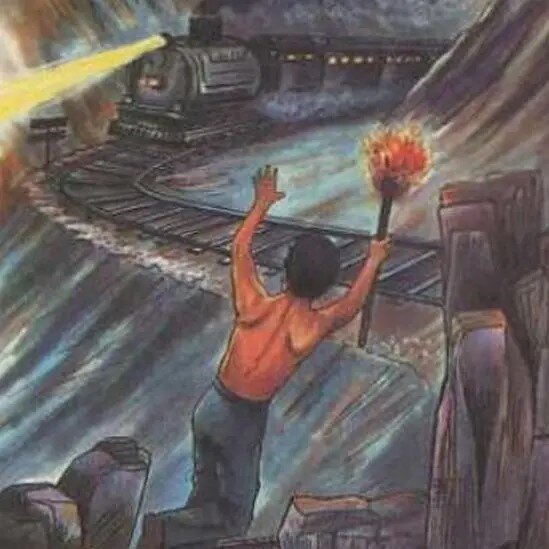Legacy of Riz Ali Khajavi Irans Devoted Farmer
Legacy of Riz Ali Khajavi: Iran's “Devoted Farmer”
TEHRAN- On an autumn evening, as Riz Ali Khajavi was returning home from the farm, he noticed that the train route had been closed due to a landslide. These opening sentences are from a story in the third-grade Persian literature textbook, recounting the heroism of a devoted farmer who has captivated the hearts of Iranian students for six decades.

Azbar Ali Hajavi, who became known as Riz Ali Khajavi in Iranian primary school textbooks due to an error made by journalists at the time of the train accident, was a dedicated farmer who etched his name in Iran's history by bravely attempting to save the lives of hundreds of passengers on the perilous railway route through the towering mountains of Miyaneh County in East Azerbaijan province. His selfless actions not only reflect the spirit of heroism but also the enduring impact of one individual's courage in the face of disaster.
He was a hardworking and conscientious villager who became a household name among Iranians when he learned of the fallen rocks blocking a train's path. In a desperate bid to stop the train, he set fire to his coat and jacket as a signal.
Riz Ali Khajavi's sacrifice on that dark night in the Miyaneh mountains transformed him into a mythical figure in Iranian culture. His selflessness resonated deeply with the public, leading to the story of his bravery being featured in one of the lessons in the third-grade textbook. This enduring tale continues to inspire and educate future generations about the values of courage and altruism.
He was born on February 24, 1931, in the village of Qala'e-Jouq in the Miyaneh County, and fate had decreed that his name would be immortalized in history forever because of his sacrifice to save the lives of some of his compatriots.
In November 1961, at the age of thirty-two, Riz Ali Khajavi was walking along the train tracks at night after returning from his farm when he noticed that the train route was blocked by a landslide in the Qaranqu region. Determined to save the train and its passengers, he set fire to his clothes and approached the train, hoping to alert the crew. However, his efforts were unsuccessful in capturing their attention. Ultimately, it was only when he fired a few shots from his hunting rifle that the "devoted farmer" succeeded in stopping the train, ensuring the safety of those on board.
But that was not the end of the story, as the passengers and train officials, who had mistaken him for bandits, initially beat him up for stopping the train, but when they realized the extent of the incident, they apologized to him and realized the importance of his work.
After that, his name found its way into textbooks, and the lesson "The Devoted Farmer" became an inseparable part of the memories of Iranian students for 60 consecutive years.
The outcome of these events demonstrated how the sacrifice of a community member can be mythologized and serve as a model for the nation's children through mass media and inclusive platforms like education. By emphasizing such acts of bravery and selflessness, society can inspire future generations and instill valuable lessons about courage and altruism.
Appreciation of the devoted farmer
It is important to note that the "Devoted Farmer" has been respected by Iranian society since the 1990s, especially in the 2000s and 2010s. During this time, many sought to honor his legacy on various occasions. In 2006, he was recognized at the third conference for awarding the National Statue of Dedication, where he received the prestigious statue. The ceremony took place in the Allameh Amini Hall at the University of Tehran, and all attendees stood to their full height in respect for Iran's "Devoted Farmer."
However, the story of the "Devoted Farmer" extended beyond textbooks and the media, becoming the subject of a film. In 1968, a documentary titled "That Night When the Rain Came (The Epic of an Azarbaijani Countryman)," directed by Kamran Shirdel, captured the narrative of the devoted peasant, further immortalizing his legacy.
Another documentary film, "The Devoted Farmer," is also a narrative of the life of Riz Ali Khajavi from the words of himself, his wife, relatives, and friends during the final days of his life; the film is a documentary narrative of the heroic story, the location of the event, and conveying the sense of sacrifice to the audience and Saman Morad Hosseini, a television and cinema director and producer, produced this film in 2017.
The "Devoted Farmer" finally passed away on Saturday, December 2, 2017, at the age of 86, after enduring 20 days of illness in Emam Reza Hospital in Tabriz, capital city of East Azarbaijan province, and was buried on December 4 in his hometown of Miyaneh County.
(Dr. Seyedhossein Hosseiniseddiq in an assistant professor of history at Islamic Azad University, Azam Sadat Hosseiniseddiq is a teacher with Shahroud City Education Department)
Photo: An Image from the “Devoted Farmer” lesson in the third-grade Iranian elementary school textbook
source: tehrantimes.com